- Home
- Julianna Baggott
Girl Talk Page 5
Girl Talk Read online
Page 5
Ever since my mother had told me about Anthony Pantuliano, I would sometimes see a puny, dark-haired kid with an oversize head and I’d catch myself looking for the bulge in his jeans, his sealed eye. I’d catch myself saying Anthony Pantuliano, my heart skipping, my stomach doing a little flip as if I were the one who’d fallen in love with him.
You can look at this idiosyncracy many ways. My therapist decided that I had not just one Electra complex but two, one for each father. (Modern families with divorces and remarriages are a bitch, by the way, for the whole Oedipus-Electra thing.) But you know how I feel about Freudian theory, its pervasive nature cuckolding an entire culture into believing we’re perverted, a force so paralyzing we can’t chew ice without analyzing our sexual anxiety. So I’ve decided that any Electra complex could be the figment of a Freud-obsessed culture, adding more simply that I was young, hormonally imbalanced, and impressionable and the stories of Anthony were as romantic as any movie I’d seen. I fell for a character, not a person, a sixteen-year-old romantic lead, certainly not my father.
But since it was my father, genetically, and my mother, I couldn’t help but take the leap that their story was a part of me. My mother started out telling me about her life with the best of intentions, but her plan, in some ways, backfired. I was bound to hear the stories not to learn lessons but to follow her.
The first time I realized that I was living my mother’s life was after I left home for college—Loyola in Baltimore. I took up with a guy named Joey Pedesto. He, too, was short and big-headed like Anthony Pantuliano; his cock, however, was more proportionate with the rest of his body, and he had both of his eyes. He was a bartender and two-bit pot dealer who’d done a stint in the navy and was taking classes at Towson State so he could eventually go on to law school. We first got together on my birthday. I’d just turned twenty-one, and although I’d been going to the bars for a long time—Gators in particular, on a corner on York Road just outside of Baltimore—it was nice to finally be legal. And I was letting Joey in on the little secret that I was not—as my fake ID claimed—Nancy Espiritu, a five-foot, 100-pound smiley American Filipino woman, but, in fact, taller and a little more buxom, with a dark, cool sense of humor.
“I’m not Filipino at all,” I told Joey conspiratorially, quite drunk. “All I know about the Philippines is that General and Mrs. MacArthur never had a second honeymoon there.”
He was taking a break from tending bar. It was late, probably midweek. My friends and I were regulars, dutifully putting in hours as if it were a library. We wore tapered jeans, sometimes pinning the cuffs, and I had a black leather bolero jacket with a hundred zippers. My partner in crime, a wild and intensely bright young woman named Liza Merchum, was chatting up some Hopkins guys wearing argyle sweaters who’d mistakenly wandered in.
“If you’re not Filipino, then what are you?”
At home, I didn’t tell the truth, that I’m half Italian, half Polish. My father, Bob Jablonski the gynecologist from Keene, came back after the summer that never happened, and I was again his daughter, two Polish halves—Verbitski and Jablonski—making a whole. I was eight hours away, though, and on my own I could tell the truth without any betrayal. I didn’t. My mother would have omitted, danced, retained some mystery. It was what she believed in. But I went for the lie.
“My mother toured with a flamenco troop. She was a Spanish dancer. She met my father, a Brit, in Samoa where he was a struggling painter. They had sex on a veranda and I was born nine months later.”
Joey had placed a cigarette between his lips, and, although I didn’t smoke, I took it from his mouth and put it in mine. He lit it. I thought it was all terribly sexy. After last call, he drove me back to his place. (Liza had already taken off with the Hopkins boys, sitting up on the backseat of a convertible Saab, wearing one of the boys’ argyle sweaters wrapped like a turban on her head.) I remember Joey’s roommate had a cargo bag filled with little bags of pot. We passed a joint back and forth on his bed, taking long, tight-lipped, sipping drags. Our eyes puffed up. We got naked. A month later, I was living there, and, every once in a while, I’d look at Joey Pedesto and I’d think, Anthony Pantuliano. I’d watch him come, his eyes squeezed shut, his hot breath on my face, and I’d mouth it: Anthony Pantuliano.
One day I drove up to the apartment building with a bag of groceries in the passenger’s seat and saw cop cars in the parking lot. I didn’t stop. I kept on going. I couldn’t reach him on the phone, no answer. A couple days later, I came back for my belongings, and the place was empty except for an older Mexican man painting the walls white over the white. He spoke no English. And I spoke no Spanish; I wasn’t the daughter of a flamenco dancer after all. I wondered what it must have been like for my mother to lose Anthony Pantuliano, to think that she would never see him again. For the first time, but not the last, I realized that I was trying to live my mother’s life. I knew it was wrong, a bad idea, but one I would continue to repeat.
By the summer of 1999, I was well rehearsed in the roles of my mother’s life. I had started an affair with Peter Kinney—who would become the father of my child—not playing the part of my mother but, worst of all, playing the part of Vivian Spivy. I had, in fact, dyed my hair red. It had been a Halloween prank to make me look more like the lead singer for the B-52s, but I had used permanent dye, and in retrospect, it’s all too obvious. I guess I’d recently come to the conclusion that Vivian was the most sympathetic character, although now I’d argue they were all sympathetic, not one of them truly in control. I had played my mother’s part a number of times, the Joey Pedesto affair being only one of many examples, and here I was as Vivian. I had no doubt that if I married, I’d end up playing the part of my father and have an affair. At the arrival of Peter Kinney into my life, my ugly college therapist with the nose-tugging twitch would have raised her tiny fists in the air, vindicated, my Electra complex having led me to a married man, a fatherly type, a Bob, at last. But in my defense, I thought I was truly in love—for the first and possibly only time in my life—with Peter, and things had taken a bad turn. There was no divorce in sight, as was the case for Vivian; he was going back to his wife.
Once upon a time, I’d loved men, their broad hands, their narrow hips, their muscled thighs, tough jaws, and soft mouths. I had my mother’s admiration of the penis. I loved the way it rolled shyly and then rose up till standing against gravity, toward warmth and comfort, the way it could betray a man’s coyness, so flushed and ready. But I’d gotten tired of dating twenty-three-year-olds who didn’t know what they wanted to be when they grew up, who wanted me to hold their hands, wipe their runny noses. I fell for Peter because he was a grown-up, married, happily. He came with excellent references, the best. He had two kids and a wife and a dog named Lu, short for lugubrious, which is to say sad, a moping long-eared basset hound. Like my father, he was the last person you’d expect to have an affair, which is one of the things that made him so attractive. He’d proven his stability and his loyalty, albeit—and this was a sticking point—not very well, but it seemed that he was at least capable of some kind of commitment. I wasn’t thinking clearly. I fooled myself into believing I wanted him to marry me, but really I was choosing a safely doomed relationship, my favorite kind.
I don’t want to rehash every minute of my love affair with Peter Kinney. The quick version: I’d been flirting with Peter for weeks, watching him sketch out happy lemons and spread different lemon faces on my desk, and then I had a minibreakdown in my office. As a copy writer at an advertising agency, I’m an idea woman. I come up with concepts and write schlocky copy. My main project at that time was the Love-That-Lemon dish detergent campaign, and I was panicked, sure we wouldn’t pull it off, furious at my boss’s insane deadlines. I was crying, maybe most of all because I knew that what I do for a living is bullshit. I knew it well before all of those articles on American stupidity so popular in the ’90s, books that I barely skimmed, like Dumbing Down: Essays on the Strip Mining of American Cultur
e, before Fussell came out with his unenlightened book BAD, or, The Dumbing of America, before all that American culture bashing, as if our stupidity were something new, as if our stupidity weren’t something of a national treasure. I was rambling, giving Peter a stream-of-consciousness speech that, if it had been coherent, would have been brilliant.
I told him that it was clear to me that I’d been raised by the ultimate hype machine, my mother. She was an ad woman for the golden life, really. She omitted the unseemly—like the fact that I was the illegitimate child of Anthony Pantuliano (all of this quite new to Peter, who’d known me for only a few weeks)—and played up the positive. But she couldn’t always distinguish what she wanted to be the truth from the truth. She raised me as best she could, in her tradition of deceit and omission, and I went into advertising. It was absolutely instinctive. It was one of the few things that made sense to me. It makes sense to me that advertising is an essential part of life, that it shapes perception, realigns neurons, that without advertising, people would smell a lemon and think of lemons, not clean plates, shine, and the vague subconscious sense that their mothers loved them. I said this part clearly, about the subconscious link between lemons and mother love. I think he understood.
I was clear enough to admit that it wouldn’t be completely honest if I said that I went into advertising because of the education that my mother passed down to me. I could have said I chose my job because it’s creative or for the money—it’s not bad—or I could have been profane and said it was because I wanted to restore hope through hype. But the truth is I chose my career out of fear. I didn’t want the machine to eat me, and yet it was eating me all the same. The subtle infiltration: my dresser lined with bottles, Kiehl’s treatment line formula, organic beeswax for my hair, Laura Mercier’s foundation primer cream as if my face were a wall in need of a paint job, and in my closet, a pair of mannish oxfords by Miu Miu, a red-lined black Tahari dress. I remember singling out a few items: “My sunglasses are Black Flys. I bought a hair straightener even though my hair is straight. If I were to ever get married, I’d buy a Vera Wang dress, regardless of markup.” I made the point, I think, that in little ways, I cave in to the machine, I fall for it.
I said, “I don’t want to be my mother, to believe that bullshit promise that each little item, if cared for deeply enough, will amount to the golden life. I thought I was in control, helping to drive the machine, that I was behind the wheel. I voted for Clinton, twice!” Here, I’m not sure he understood what Clinton had to do with anything. I could have explained that it was the same kind of duping. I signed on to a pot-smoking, draft-dodging philanderer, my eyes wide open. I was sucked in by Clinton’s dented armor and because I wasn’t getting sucked in by shiny armor, I didn’t realize I was getting sucked in all the same.
I said, “My mother’s generation had faith in the golden life, in virtue, pride, the American dream. I can’t. Nixon resigned when I was four years old. My earliest word association with president is crook. Any shine left over from World War II was completely muddied by Vietnam. I missed seeing Neil and Buzz moon-walk, but I was watching television my sophomore year with my entire Catholic high school—televisions set up in classrooms, the cafeteria—when the spaceship Challenger exploded. And as soon as my hormones started to kick in, AIDS showed up and that party was called off. No sex, no drugs. Even rock and roll turned into fucking ‘Wake Me Up Before You Go-go’ and ‘Abracadabra.’ I’m my mother, but I can’t be. See?”
I sat down on my desk, which was strewn with Peter’s lemon sketches. I ran my hands through my hair. I hiccupped, wiping the tears from my cheeks. “I’m not married. I have no kids. I’m almost thirty. And what I care about most is a fucking lemon that either does or does not wink, and, if so, with the left or right eye?”
He walked up close, then kissed my cheek and then my mouth, and I kissed back. It was a year of office quickies and an occasional overnight at my place, lots of late-night phone calls with long, hot silences. I was always waiting for him to confide in me, to tell me his secrets, the way maybe my father told his secrets to Vivian. I told him mine. But he didn’t reciprocate; perhaps he had no secrets or he’d already let his go, to his wife. We didn’t have the advantage of running off together, like Vivian and my father. Peter had to bounce back and forth between his wife and me, two very different realities of himself, which made it tough. And then his wife was pregnant with their third. I was pissed. He’d never mentioned that he was sleeping with his wife. I felt cheated on, although that isn’t logical. Of course he was sleeping with his wife! And the third child was a deal breaker for him; there was no getting out. Slowly I started to feel like another burden, a responsibility.
I loved Peter Kinney because he loved people easily, intensely. He walked through the city falling in love with people: the Chinese grocer angrily spraying rowed tangerines, the girl crying into the pay phone, the cabbie singing along happily to the Muslim station. Peter would sit in the back of the cab and sing, too, in Arabic, the best he could. He was the type of man who, when passing a field of cows—we once went to the Jersey shore together—rapped his fist on the car door, stuck his body out the window, and mooed at the top of his lungs. He felt he had something in common with everyone.
He broke up with me on a Saturday at a laundromat, cleverly named Laundromat, on MacDougal Street. It was one of our favorite spots. We liked to whisper in a back corner over the noisy churning machines. But things were winding down. Ours was obviously a crumbling relationship. I had just taken my first few pregnancy tests. I had one in a Ziploc bag in my pocketbook.
Peter, not a big guy, had sandy hair and blue eyes with heavy lashes. I was already crying and he was choked up, too. He said, “You know, I envy those guys on talk shows, pilots and traveling salesmen, who have one wife in Duluth and one in Ho-Ho-Kus and another in Baltimore. I don’t want to have an affair. I love my wife, and I want to marry you. I want to lead a bunch of lives, a kind of compressed reincarnation without the uncertainty of death. Do you know what I mean?”
A lot of the time I didn’t know what he meant. He spoke in hypotheses that jumped over important points. But this time I did; hadn’t I been borrowing other people’s lives, my mother’s, Vivian’s, and now, pregnant with no husband, my mother’s life again? But I was too angry to agree with him. “You know, when the guy dies of a heart attack, everyone comes to claim the body,” I said. “It’s a reunion to some fucked-up family no one wants an invitation to. You’re an egomaniac. You want everybody to love you.”
“Don’t you?”
“No,” I said, confused, angry. “No, just you, only you,” I said, sounding like some soap opera diva. I thought of Vivian and my father, how she must have felt when it unraveled. She had so much to lose, not just a man, but a way of life. If he loved her, if she could keep him, she wouldn’t have to go back to her crazy mother and her possibly incestuous father (I’d inflated Ruth Spivy’s comment in my mother’s foyer that Vivian’s father loved his daughter too much), to concrete-pouring brothers and dog racing. And what did I get if I could win over Peter Kinney? A way out of smoky bars, blind dates, orgiastic failures of love. I was so tired of having to hear strangers’ life stories, to nurse them through memories of their fat childhoods, their evil mothers sending them off to athletic camps, cowering in the shadows of their fathers who hid behind newspapers and in basements tinkering with boats in bottles, of understanding men’s weird quirks—waking up to find them masturbating in the middle of the night, clutching my panties, for example. I was tired of handing over my own life story, only to have to repackage it for the next fucking weirdo. I was tired of get-togethers with girlfriends where I always felt forced to spill my loveless life on the table like dumping out my pocketbook—tampons, lipsticks, a circular diaphragm case, everything rolling off in every direction.
Sitting there in the laundromat, I started to feel that heaviness, my uterus just pouching enough to make my pants instantly tight, the button strings taut.
I held my pocketbook in close to my ribs and glanced around at the people folding and sorting. I thought about slapping the test down on the table, asking him to choose. But I didn’t do it. I couldn’t do it to his wife, his two kids, the one just on the way. I decided then that it would be like a virgin birth, that my child would have no father—though I was by no means a virgin. Everyone knows the precedents for this virgin birth: Mary’s conception of Jesus and, if you can allow yourself Bob Jablonski’s willful suspension of disbelief, my mother’s conception of me. But it was not a calm decision. I was panicked inside, shaking. I stood up, rumpled his hair like he was just some kid on the street, and then I walked out of the place. He didn’t follow me. He just sat there and watched me go. And I felt a strange relief, thinking maybe I’d begun to believe in the golden life too much, that I’d begun to rely on hope—the most dangerous emotion—through Peter Kinney. Wasn’t this the best outcome, the only outcome, finally arrived?

 Burn
Burn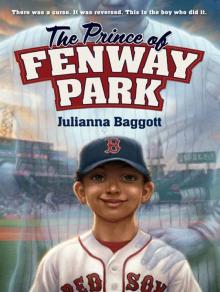 The Prince of Fenway Park
The Prince of Fenway Park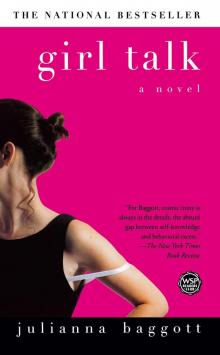 Girl Talk
Girl Talk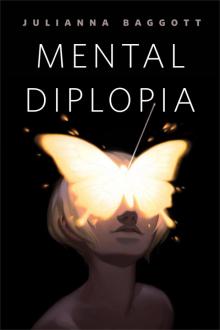 Mental Diplopia
Mental Diplopia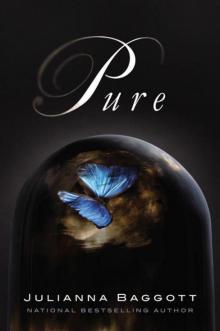 Pure
Pure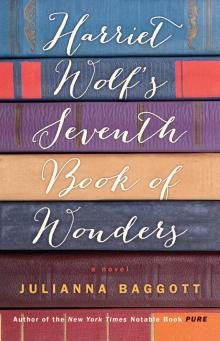 Harriet Wolf's Seventh Book of Wonders
Harriet Wolf's Seventh Book of Wonders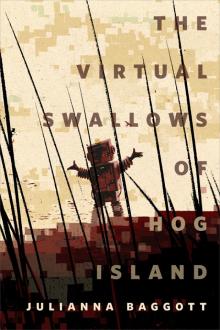 The Virtual Swallows of Hog Island
The Virtual Swallows of Hog Island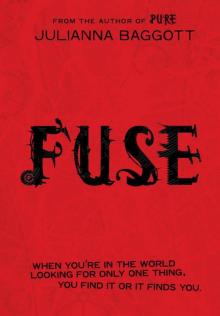 Fuse
Fuse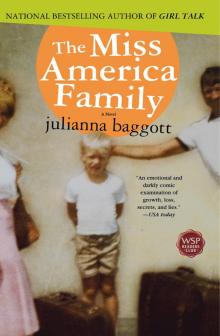 The Miss America Family
The Miss America Family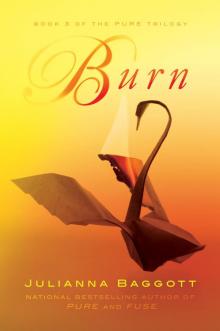 Burn (The Pure Trilogy)
Burn (The Pure Trilogy)